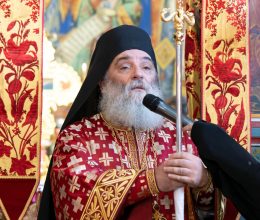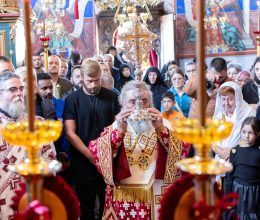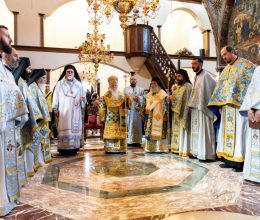
A day of joy and festivity, a birth great and wondrous! Today the Forerunner is born—the voice of the Word, the voice crying out from the wilderness: Repent! Behold, the new era begins, the years in which God will establish a New Covenant with humankind—a Covenant of reconciliation and love, of peace and unity with God. The Mother Mary is coming with the Christ Child in her womb, to meet with mother Elizabeth and the Prophet of God in her own womb. A spiritual spring is foretold, and the child leaps for joy within his mother. What a wondrous encounter, what an outpouring of the Holy Spirit—a heavenly illumination, true theology! The righteous Joseph in prayer, the High Priest Zechariah in silence, both eagerly awaiting the two births.
And behold, today the uncreated light shines! The Baptist is born, and the silence of his father is lifted! The prophet appears, and the Word is proclaimed! The Forerunner emerges from the aged womb, and the fruits of repentance spring forth! The temple of Bigorski, once again, is adorned in festive splendor, the chanters fill the air with hymns of prayer and praise, and all are gathered in honor of the birth of the greatest born of women. The Church, both heavenly and earthly, exults in radiant joy, rejoicing in the communion of Christ’s love.
This year, the Forerunner of the Lord has graciously showered his monastery with inexpressible blessings. He, who is the chief of the monastic life and the guide in this great mystery of love between God and man, has rewarded the Bigorski Monastery with five new monastic vocations, planted in his courtyard and nurtured by the sacrificial love and care of our spiritual father, teacher, and Elder, His Grace, Bishop Parthenius of Antania. “Hasten to open to me the Father’s embrace…”—his tender voice resounded in the church as he led his spiritual children to the altar of self-denial and complete offering in service to God. For the first time in the recent history of this beacon of Bigorski, five God-loving souls simultaneously donned the holy angelic schema, becoming monks of the Lord Jesus Christ. Their monastic tonsure, according to established tradition, was performed by the hands of our esteemed and monastic-loving Pimenarch, His Eminence, Metropolitan Timothy of Debar and Kichevo. These fathers and brothers—Joanikios, Joachim, Philip, Angelarios, and Grigorios—voluntarily renounced this world and were born for the “new heaven and the new earth.”
In this God-blessed moment, when our hearts were more in Heaven than on Earth, our Metropolitan delivered his pastoral guidance to the newly tonsured monks:
In the name of the Father, and of the Son, and of the Holy Spirit!
Dear brothers and sisters!
We are all called, as Christians, to be obedient servants of God. The Son of God Himself says of Himself: “I have come down from heaven, not to do My own will, but the will of Him who sent Me” (John 6:38). With complete humility, He fulfilled the will of the Heavenly Father, proclaiming salvation and offering Himself as a sacrifice of God’s love for humanity. Jesus Christ fulfilled the will of God in all circumstances, adversities, temptations, tortures, and sufferings. How awe-inspiring is the example of divine obedience when, in the Garden of Gethsemane, seeing the cup of suffering He was to drink, He prayed and said: “My Father, if it is possible, let this cup pass from Me; nevertheless, not as I will, but as You will” (Matt. 26:39). Jesus Christ, in the Lord’s Prayer, in the most profound petition of man to God, says: “Thy will be done” (Matt. 6:9).
Thus did all of Christ’s disciples pray, as did all the righteous and holy ones. What was the essence of the struggle of the saints of God throughout all ages? It was that, above all else, they placed God’s will. Their minds were subjected to the will of God, and their entire effort was directed toward contemplation—both in their personal and communal lives. The servants of God subjected their hearts to the will of God so that all their desires and longings were directed toward it. The saints were God-obedient, for they aligned all their desires and pursuits with the will of God. They knew nothing more precious than the will of God and had no other path in life except the one illuminated by God’s law. And even more than that! They did not even perform the daily tasks of life without first subjecting them to the will of God.
As Christians, we are all called to be obedient to God’s will. But let us not forget that this duty is especially the calling of monastics, who have taken up their cross and followed Christ. Who can follow Christ if they have not taken up the cross of obedience to God? What benefit is it to a person if they do not know God’s law but follow their own will? Does not the holy Apostle Paul tell us: “It is not the hearers of the Law who are righteous before God, but the doers of the Law who will be justified” (Rom. 2:13)?
All of us must subject our minds to the law of God. Our minds must be lifted upward toward God, enlightened by His light, and in all things, we must seek the will of God. We must subject our entire path of life to it. When the law of God does not actively work in the human heart, many other dark forces penetrate it, giving birth to desires and ambitions that do not elevate a person but bind them to sin. These forces render them powerless to live a life of goodness.
Some might say that this is difficult to achieve. But the question is not whether it is difficult, but whether it is beneficial and necessary for our lives to be obedient to God. Those who obey God are the children of God, and as such, they are children of light. Where the human heart and mind transmit this light, something beneficial is unconditionally accomplished for all people. This is why the children of God are always beneficial in life. They are the salt of the earth and the light of the world (Matt. 5:13-14).
The children of God proclaim God’s love both in word and deed. By following that will in their own lives, they preach it so that it may spread more and more into the hearts of others, bringing them into obedience to God’s law, the law of goodness, love, peace, piety, and mutual respect among people. The Lord Jesus Christ Himself calls the peacemakers the children of God (Matt. 5:9). They are the obedient ones who fulfill the will of God.
All these words apply to us Christians, but especially to the newly tonsured monastics. As we congratulate them on receiving the angelic rank, we remind them to always remember that we are all called to fulfill God’s will, not our own. May they wear the monastic habit for the glorification of the Triune God, for the affirmation of the Macedonian Orthodox Church – the Archdiocese of Ohrid, for the honor and dignity of this holy monastery, and for the salvation of their souls. Amen!
The birth of a human being is a great joy. Another act of Divine love. A new life is born, a new joy, unique, godlike, free, and sovereign person. The newborn person embarks on the path of life, laying the foundations of their journey, entering into communion with many others. What an experience! What an encounter! In the same way, monastic spiritual birth is an incomprehensible gift from the Eternal Trinity, a loving adoption, an irreplaceable experience.
Following this Trinitarian grace of Divine adoption came the Mystery of all Mysteries—the Holy Liturgy, in which our entire existence is contained. Today’s Eucharist, presided over by our beloved Metropolitan Timothy, was a blessed experience of unity in the Lord’s Chalice. Serving alongside our holy Bishop were the God-loving Bishops: His Grace Nikephoros of Amorion and His Grace Parthenius of Antania, as well as the Most Reverend Archimandrites: Fr. Matthaios and Fr. Ambrosios from the Orthodox Church of Greece, Fr. Nikanor from the Orthodox Church of Bulgaria, Fr. Dositej from our Monastery, along with several priests from neighboring sister churches.
The radiance of the glory of Saint John the Forerunner especially shone upon our newly tonsured brother, Fr. Grigorios, who on this sacred day of the Forerunner’s feast, was deemed worthy to bear the new obedience of hierodeacon, for the glory and honor of the Bigorski Monastery and the Church of Christ.
And once again, our Metropolitan Timothy did not fail to enrich our sacred gathering with a spiritually edifying word:
In the name of the Father, and of the Son, and of the Holy Spirit!
Dear brothers and sisters!
Today we celebrate the birth of Saint John the Prophet, Forerunner, and Baptist. He is the one who prepared the way of the Lord and was a fiery preacher of repentance. He is the saint of whom the Lord Christ Himself said: “Among those born of women, there is no one greater than John the Baptist” (Luke 7:28). Saint John is known as the preacher of repentance. His primary mission was one of repentance. He called people to repentance. But what is repentance? Repentance is the awakening of the conscience. Each of us knows that the conscience is the inner voice that accuses us of our transgressions. It is the feeling of guilt. If a person approaches confession formally and mechanically, as often happens in the Holy Church, without genuine repentance and without being convicted by the conscience, then their actions are futile. Let us look at what Saint John the Baptist says and what he calls us to. He was a man of the Old Testament. People sought to fulfill the laws of the Old Testament, received from above, and through them attain salvation. Saint John called people to repentance because they had strayed from the Law, especially in the most important aspects—the spiritual and moral laws it carried. For Saint John the Forerunner and those he baptized in the Jordan River, it was crucial to establish a visible connection with repentance, which was expressed through washing in the Jordan for the forgiveness of sins. The Law, as a rule for life, had been violated by the people. John sought to restore the Law into the lives of the repentant.
Indeed, the Law played a significant role in the religious life of the ancient Jews, for it provided clear norms. Departing from them meant violating God’s will, and repentance meant re-establishing the relationship with God. Public repentance was a testimony to true inner repentance within a person.
However, we also know that during that time, many pagans lived. What happened with them? They did not know the Law. They did not have the Old Testament and did not read the Scriptures. Yet today, in the Apostle’s reading, we heard the words of Saint Paul, who said: “For when Gentiles, who do not have the Law, by nature do what the Law requires, they are a law to themselves, even though they do not have the Law. They show that the work of the Law is written on their hearts, while their conscience also bears witness, and their conflicting thoughts accuse or even excuse them” (Rom. 2:14-15). These words were revolutionary at that time. The Gentiles, by their very nature, have a law. Without a doubt, these words must have sounded like blasphemy and a violation of the Mosaic Law. And that Law, too, demanded repentance, just as the Forerunner did. As the Apostle Paul says, the Gentiles by their nature do good, and thus they are a law unto themselves. What does it mean that they “by nature do good”? It means that human nature is created by God, and the Law given by God through Moses and the Law given through Christ have an internal, ontological connection. This shows that the moral content of the Law, both Old and New, corresponds to the moral nature of humankind. It was pleasing to God to create man in this way—man’s nature is inscribed with the moral principle that, in essence, aligns with God’s Law, both Old and New.
Indeed, this moral law exists within every human being. Yet, the Divine Law is necessary, for it clearly shows how one ought to act. This is why Saint John called everyone to repentance, to reconcile their lives. That call still resounds to us today. It is necessary for all of us to sincerely repent of our sins, to seek forgiveness from Christ, and to correct our lives. By the prayers of Saint John the Baptist and Forerunner of the Lord, may it be so! Amen!
How can we not bless and glorify you, O John, Baptist of Christ? For you are for us the most refreshing source of living water in the wilderness of this temporary life. A fragrant desert flower and angelic bird, watching over and protecting your holy and glorious sanctuary of Bigorski. You bring us grace and mercy from the depths of God’s goodness and always lift us, the humbled, to a high rock of refreshment, just as you have lifted your Sacred Monastery to the high rock of Bigorski. We do not know how to thank you for your countless virtues and the unfathomable acts of grace you bestow upon us all. You have, with the greatest care, chosen and set as a light for all of us our beloved Elder and Abbot, His Grace Bishop Parthenius, to illuminate our path to God, to guide us, and nurture us in the monastic ethos, filling the land of Bigorski with heaven and angels, with joy and praise. Bless and enlighten us to continually bear fruits of repentance and to show ourselves worthy of the calling with which you have called us and gathered us into your honorable home.
We entrust our hearts and souls to you—our weaknesses and sins, our infirmities and frailties—make us citizens of heaven, an army of Christ, a beloved and sacrificial brotherhood around our good and beloved Elder, uniting us in Trinitarian love and humility.















